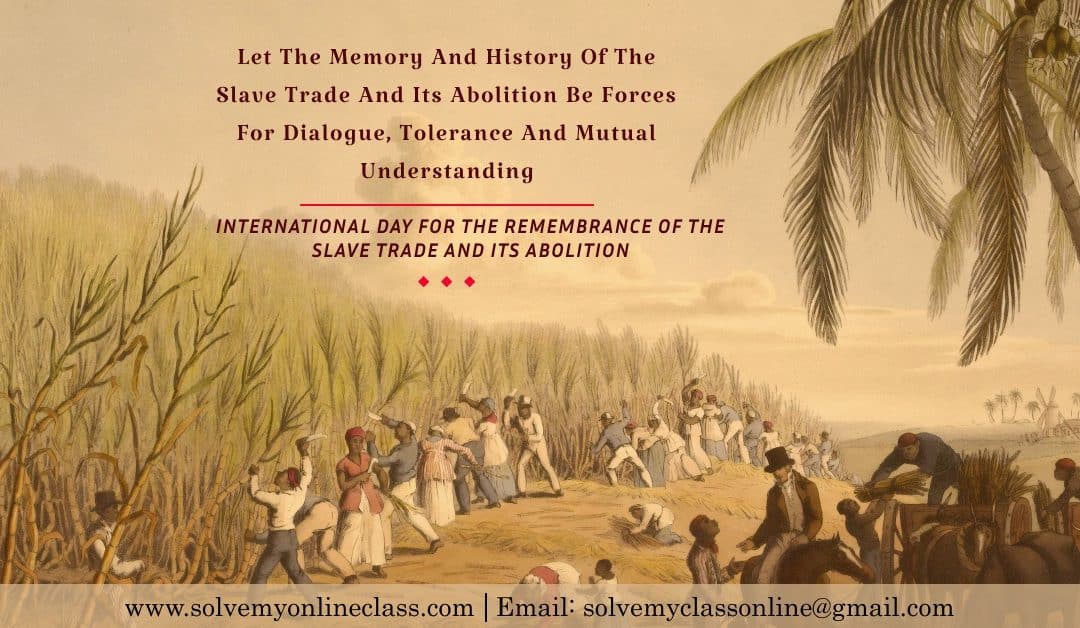This International Day for the Remembrance of the Slave Trade and its Abolition is a global day celebrated on 23rd August every year, the day chosen by United Nations Educational, Scientific and Cultural Organization (UNESCO) for memorizing the transatlantic slave trade. Moreover, International Day for the Remembrance of the Slave Trade and its Abolition wishes to inscribe the tragedy of the black slave trade in the memory of every human being in the entire world.
In addition, ‘The Slave Route’ provides a scope in regards to collective consideration of the historical processes and causes along with the consequences of this tragedy and for an assessment of the communications towards which it has provided rise between Europe, Africa, the Caribbean, and the Americans.
The background of International Day for the Remembrance of the Slave Trade and its Abolition
- Such International Day for the Remembrance of the Slave Trade and its Abolition has been observed to remember the uprising on 23rd August 1791 at Santo Domingo (present-day Haiti and the Dominion Republic) that played a vital role in the abolition of the transatlantic slave trade.
- The International Day for the Remembrance of the Slave Trade and its Abolition was first celebrated in several nations, mainly in Haiti on 23rd August 1988 and in Goree Island in Senegal on 23rd August 1999.
- On 25th March 1807, King George 3 of England signed the act to abolish the slave trade and ban the trading of black enslaved human beings in the British Empire.
- The primary cause concerning the abolition of the slave trade had been that the slave trade was evil and that assisting abolition had been the moral and ethical thing to do.
The subject matter of International Day for the Remembrance of the Slave Trade and its Abolition
- The theme of International Day for the Remembrance of the Slave Trade and its Abolition has been ‘Stories of Courage: Resistance to Slavery and Unity against Racism’.
- This transatlantic slave trade had been an occurrence featured degrading economic transactions, mass human trafficking along with unspeakable violations of human rights.
- The stories of those human beings who fought against their tyrants, the accounts of those people who conquered against every odd to win their freedom and these stories continue at the present times since the human beings throughout the world keep struggling together against the continuing legacy of the transatlantic slave trade, i.e., racism.
The scopes of International Day for the Remembrance of the Slave Trade and its Abolition
- Examining the transatlantic slave trade at the micro level discloses its authentic identity, and behind the figures and facts are millions of stories of human beings.
- There have been stories of black people who had been ripped from their family members and their homelands.
- The stories of pain and untold sufferings, the levels of rebelliousness, and awe-inspiring strength against the cruelty of the oppressors.
- Such International Day of Remembrance of the victims of slavery and the transatlantic slave trade has been a period to study and reflect upon these stories.
- The Ark of Return has been a stronger reminder of the tragic legacy of the transatlantic slave trade and slavery.
The prospect of International Day for the Remembrance of the Slave Trade and its Abolition
- It has been the time to pay tribute to millions of black Africans who had been torn from their societies and homelands and standing up in solidarity against racism at every place.
- On such International Day for the Remembrance of the Slave Trade and its Abolition, it has been important for all human beings from all over the world to stand united against racism along with building communities together based on equality, harmony, and dignity.
- In modern times, black people of African descent continue to deal with marginalization, racial discrimination, and exclusion.
- The economic, political, and structural strength inequality rooted in exploitation, enslavement, and colonial rule denies equality of justice, opportunity, and peace in modern times.
- Human beings have been significant in raising their voices as they fight against prejudice and racism worldwide.




